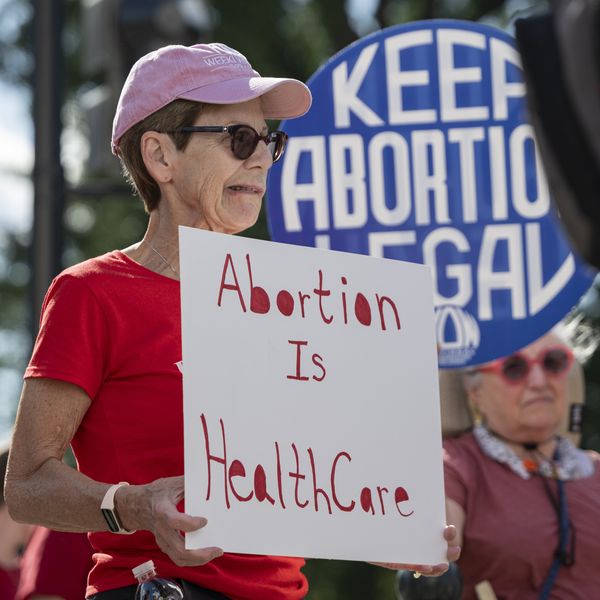Reproductive rights advocates, attorneys, and family members of people who have died as a result of Poland's stringent abortion ban were among those who testified before the European Parliament in Brussels on Thursday, calling on the body to take every available action to protect Polish people from "conservative politicians" whose ban has led to at least six deaths so far.
Barbara Skrobol, the sister-in-law of the late Izabela Sajbor, who died of sepsis in September 2021 because doctors refused to terminate her nonviable pregnancy, described Sajbor's harrowing last moments to European Union lawmakers.
"We were not [allowed] to visit her but received text messages from her saying the doctors were waiting for her fetus' heartbeat to stop," Skrobol said in her testimony. "Iza knew her life was in danger but was keen to live for her family. Just hours before she died, her last text message said, 'Women are being treated as incubators.'"
The family's lawyer, Jolanta Budzowska, told the parliament that Sajbor likely meant "that nobody cared about her life."
"The most important thing for everyone, including the doctors in the hospital, was firstly the life of the fetus, and secondly the legal situation of the doctors," Budzowska said.
"In the name of Izabela, Justyna, Ania, Marta who lost their lives and all women in Poland, this needs to stop immediately."
Skrobol noted that Sajbor, who was 30, left behind a young daughter, saying, "Let us not take away wives from their husbands and mothers from their children and continue fighting for our rights."
Sajbor, whose death sparked nationwide protests, died nearly a year after Poland's Constitutional Tribunal ruled that abortion care cannot legally be provided in the case of fetal abnormalities or nonviability. The government later ratified legislation stating that pregnant people can have abortions in cases of rape or incest--if they can prove they were assaulted--or if their life is in danger.
According to Kamila Ferenc, a lawyer at the Foundation for Women and Family Planning (FEDERA) in Warsaw, at least 70,000 pregnant people have been directly affected by Poland's abortion ban, including at least six who have died.
"Even accessing contraceptives is hard" under the law, Ferenc told Al Jazeera.
The E.U. Parliament adopted a resolution in November 2021 calling on Poland to lift the ban.
"It is important for the E.U. to call on Poland to lift this ban and also ensure that every E.U. nation gives women the right to undergo abortions," said Robert Biedron, a Polish lawmaker who chairs the European Parliament's Women's Rights and Gender Equality Committee, at the hearing. "This should be a part of the bloc's strategy on health and reproductive rights."
Biedron also noted that Ukrainian women who have sought refuge in Poland since Russia invaded their home country have suffered under abortion laws that are far more stringent than Ukraine's.
He told Al Jazeera "that the E.U. should consider including a clause to let them seek abortion services freely in every E.U. country as a part of the bloc's temporary protection directive, which gives Ukrainians the right to live and avail medical care, work opportunities, and education till 2024 in the E.U."
Caroline Hickson, regional director of the International Planned Parenthood Federation European Network, told parliament that the E.U. must also work to protect pro-abortion rights advocates who have protested the ban and have been penalized for doing so.
"Many women like Marta Lempart, who are leading the Polish Women's Strike, have been slapped with charges for protesting the government's laws," said Hickson, naming the founder of the country's recent pro-choice movement, who has 80 pending legal cases against her according to Human Rights Watch. "The right to peacefully protest needs to be protected in the E.U."
"The European Parliament must continue to put pressure on the Polish government and use all the tools it has, or more women will die," Hickson added.
The Party of European Socialists (PES), which has 145 members in the European Parliament, called Poland's ban "barbaric" and demanded that the body hold the country's far-right Law and Justice Party accountable.
"In the name of Izabela, Justyna, Ania, Marta who lost their lives and all women in Poland, this needs to stop immediately," said PES.



